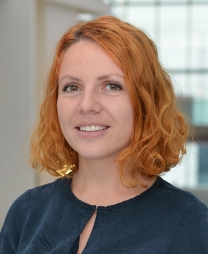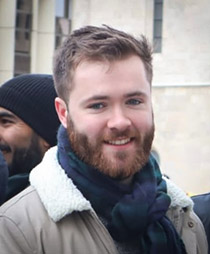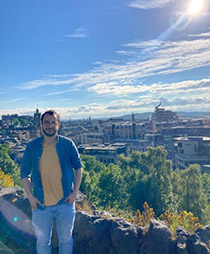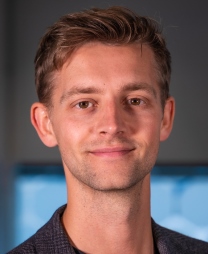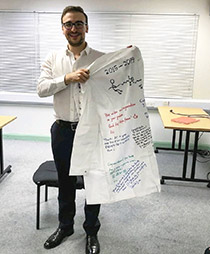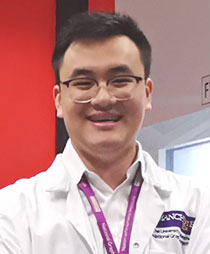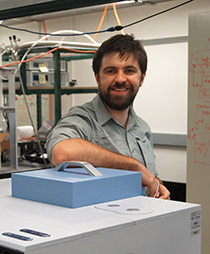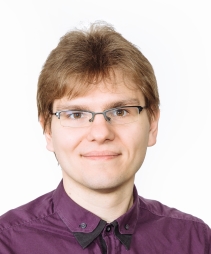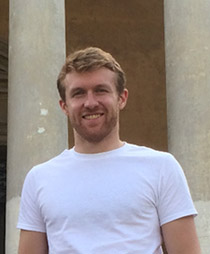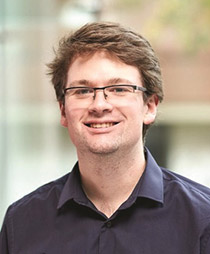Alumni community
After completing 4 years with the CDT our graduate’s doctorates have taken them around the globe into a wide variety of different careers, however they remain an integral part of the CDT family who regularly contribute to CDT events and offer their expertise to current students.
Our alumni have taken up positions as industrial and academic research scientists, government advisors, entrepreneurs, patent attorneys, science writers and much more. Some graduates have continued working for the company that sponsored their research and many use the connections they made during their PhD to forge their career.
We strongly encourage and promote interaction between our alumni and our current cohorts of students. We have a CDT LinkedIn group which provides a base for day-to-day interactions and our alumni graduates are invited to speak at our annual conference and other CDT events during the year.
Here are a few examples of our alumni and the direction their careers have taken:
-
Dr Livia E Crica, graduated in 2021
Livia joined The University of Manchester Graphene NOWNANO Centre for Doctoral Training in September 2016. Her research completed in the lab of Prof. Kostarelos at the Faculty of Biology Medicine and Health focused on studying the in vivo urinary protein corona formation upon exposing healthy and diseased murine models to graphene oxide nanomaterials.
Being a "pandemic PhD student", she obtained her degree in 2021 after a successful online viva examination. Following her PhD, she took a 1 year sabbatical break to spend time with friends and family, travel, hike, eat traditional food and relax.
Currently, Livia works as a real-world evidence consultant at IQVIA Real-World Solutions Team in Basel, Switzerland. There, she manages and contributes to various R&D projects for big pharma clients, including post-authorisation safety studies, integrated evidence planning, real world data landscaping and health-economic modelling.
-
Daniel Kelly, graduated in 2020
I finished my PhD with the Graphene NOWNANO CDT at the end of 2019, after which I spent 8 months as an EPSRC Doctoral Prize Fellow at The University of Manchester before moving to the Technical University of Denmark where I currently work as a post-doctoral researcher. My work at DTU still remains focused on characterisation of two-dimensional materials using transmission electron microscopy, but with an increased emphasis on the investigating the behaviour and stability of such materials under high pressure and temperature environments.
Even two years later, I still reap the benefits of having completed my PhD on the Graphene NOWNANO CDT. Starting my PhD as part of a cohort of PhD students was a huge benefit to someone like me who had never even been to Manchester before starting my studies and I am still in touch with many people from the CDT. Aside from the social aspect, being grouped with students from such varied backgrounds and having close contact with the academics involved in the CDT was a great way to expand my academic network and I was fortunate enough to co-author a few publications with my colleagues from the CDT during my PhD.
A major advantage of being a student on the Graphene NOWNANO program was access to resources that have really helped me continue my career in academia. The funding to attend conferences, both near (Manchester Central Convention Centre) and far (Sydney), gave me the chance to refine my presentation skills, gain exposure for my research and meet other researchers. In addition, the opportunity to go on secondment as part of the CDT is invaluable for a PhD student. Even though I did not manage to organise a secondment for myself, my brief search for a placement I got in touch with a professor at DTU with links to the CDT to discuss a potential exchange at DTU and three years later that opened the door for me to secure a post-doc in their lab at DTU.
-
Servet Ozdemir, graduated in 2020
After having submitted my PhD thesis in September, I have moved to Heriot-Watt University in Edinburgh, to work in the Quantum Photonics Laboratory of Prof Brian Gerardot. My incredible experience at Manchester has been very helpful to be able to find the post-doc position I wanted, where I am currently gaining complementary experience for my career on top of the expertise I have built during my PhD. If you do end up leaving Manchester when you finish your PhDs, you shall be respected a lot as graphene and 2D materials experts, being from the graphene city and having completed the prestigious Graphene NOWNANO programme.
-
Seb Leaper, graduated in 2019
Seb completed his PhD in 2019 from the Department of Chemical Engineering after joining the 2015 cohort of the Graphene NOWNANO CDT programme. His PhD research focused on a water treatment technology known as membrane distillation which is capable of producing drinking water from highly concentrated brines.
During his PhD he won first prize in the Eli and Britt Harari Graphene Enterprise Award, providing him with a £50k grant to work towards commercialising his ideas. He has since founded spin-out company Watercycle Technologies which is applying Seb and co-founder Dr Ahmed Abdelkarim's research to extracting lithium and other critical minerals from various water sources. The company, of which Seb is CEO, received £500k equity investment with Aer Ventures in March 2022 and a further £500k from Innovate UK through their highly competitive Smart Grant program. The team of 10 is working in several exciting projects with various UK and international partners with the aim to supply the growing demand for lithium driven by electric vehicles.
Seb says 'The CDT provides the student with the perfect balance of breadth and depth. Innovations often come about by making connections between different subject areas. Making friends with a cohort of physicists, biologists, chemists, chemical engineers and materials scientists, as I did on the CDT, put me in a unique position to innovate.'
-
Richard Stevenson, graduated in 2019
Since completing my PhD at the end of 2019 I have moved on to a Research Officer position at M&I Materials. M&I are based in Trafford Park, although I spend most of my time working out of GEIC. We manufacture a wide spectrum of products including dielectric fluids and coolants, vacuum greases, high energy varistors and tungsten alloys. My role as a Research Officer is on the Materials Science team where I am responsible for the development and innovation of new products, process changes and application areas. My main focus is in the speciality products, namely greases and alloys.
My work is very varied in scope taking in parts of chemistry, materials science, physics and metallurgy but by doing my PhD through the CDT it has prepared me for working with colleagues with different technical backgrounds: my PhD itself was heavily organic and polymer chemistry based but through the CDT I got to know and be exposed to a broad range of research. My current work is actually very different from the synthetic chemistry of my PhD.
During my PhD I undertook a CDT funded secondment at Malvern Panalytical as an Application Scientist which provided me excellent exposure to the industrial science workplace, an experience that really cannot be understated. The outreach programmes encouraged by the CDT has also helped me communicate my work to non-technical colleagues at M&I, such as those in the commercial, marketing and sales teams.
-
Dian Yi, graduated in 2019
Dian Yi, from the 2015 Graphene NOWNANO CDT PhD Cohort, graduated at the end of 2019. His project “Development of the next generation graphene based electronic materials” (funded by Alpha Metals Inc.) was one of the earliest industrial projects based in the NGI.
After returning to China, I stayed in my hometown Shenzhen, Guangdong, and became the Deputy Chief Technology Officer of a then newly-formed company called Guangdong Graphene Innovation Center where Professor Sir Andre Geim is the Honorary Director of Technical Expert Committe of the company. I worked in this company for a year and a half before I became the CTO and a partner of another newly formed company, Shenzhen HanKe New Material Technology Co., Ltd, specialising in thermal interface material, coating tech and industrial scale magnetron sputtering tech.
So far since graduation, I have been focusing on industry and have filed 24 Chinese invention patents as the first inventor (14 of them are granted). Besides the Chinese invention patents, I have also filed 5 PCT applications and 1 United States utility patent as the first inventor.
The University of Manchester is like a second home to me and I do miss all the time spent in Manchester as part of my lifetime. That is why I have always tried to keep in touch with my old colleagues back in Manchester and if I can, I may come back and visit Manchester some time in the future. -
Tom Folland, graduated in 2017
I completed my NOWNANO PhD in 2017, working on graphene controlled THz Quantum Cascade Lasers in the lab of Dr Chakraborty in the school of electrical engineering. After my doctoral work, I took a postdoc position in the lab of Prof Joshua Caldwell in the school of Mechanical Engineering at Vanderbilt University in Nashville, TN. At Vanderbilt, I led the setup of the Caldwell lab and developed new approaches to infrared spectroscopy for the study of nanophotonics systems, including 2D materials and semiconductors. After the start of the last academic year, I took an assistant professor position in the department of Physics and Astronomy at the University of Iowa, IA. Here I am investigating how nanophotonics can be used to enhance infrared optoelectronics, as well as creating strongly coupled systems.
NOWNANO was extremely helpful in my training as it provided a broad knowledge base that has helped me work with a range of academics with different backgrounds (as perhaps indicated by the different departments I have worked in). This was both through the courses, as well as through the summer school which allowed me to interact with others in the program. I've also been able to use some of the connections I made during NOWNANO beyond the scheme, and have asked and answered questions about life beyond the PhD from former students.
-
Jacek K. Wychowaniec in 2017
After graduation, firstly I undertook a 1-year Science and Technology officer role at NanoBioMedical Centre in Poznań, Poland. Subsequently from 2018-2021, I was a Post-Doctoral Research Fellow at the School of Chemistry, University College Dublin, Ireland, working on developing innovative and responsive magnetic soft materials, magnetic fabrication technologies and contributing to the materials design for automated organoids growth.
Besides these exciting projects, I also successfully secured my own small Researcher Mobility Grant by Royal Society of Chemistry for collaborative project entitled: “Interfacing magnetically responsive nanocomposites with patient-derived cancer organoids for development of in-vitro anticancer drug screening platform” with the Universidad de Concepción in Chile and contributed to writing the successful project “Next Generation Magnetic Beads for enhanced viral RNA detection and improved COVID19 Testing, Securing Supply, Improving Performance.” project.
The DTC NowNano programme at The University of Manchester gave me an immense edge to scientific and industrial networks that were and still are invaluable in my current activities. My 4 years spent in Manchester were fantastic and I still feel nostalgic every time I visit – it really feels like home! Along the way I have made many friends with whom we are currently pursuing various scientific and industrial project, including being recipients of the Venture Further 2019 and Eli and Brit Harari 2019 awards for the AEH Hydrogel Ltd.! To this day we actively keep collaborating with my PhD supervisor Prof. Alberto Saiani, which has been extremely supportive throughout my time in Manchester, as well as afterwards. DTC & Manchester definitely helped shape my current self!
-
Nick Kay, graduated in 2016
Working as the Head of Photonics Research and Development at Cambridge Quantum Computing Ltd my role is to help take interesting research ideas and develop them into practical quantum photonic devices. To do this we need to have a knowledge of and work within many different areas outside of our expertise, not only within science but with commercialisation and business too. This is where the multidisciplinary aspect of the CDT has been invaluable. It gave me the opportunity to work with world leaders at the cutting edge in my chosen field as well as equipping me with the knowledge to understand and exploit the real world applications of this research. Pursuing a PhD through the CDT was a fantastic experience.
-
Stephen David Worrall, graduated in 2016
I benefited hugely from being part of the NOWNANO DTC. By being thrown together with a bunch of other new PhD students from such a wide range of academic backgrounds you quickly build an amazing network that can support you both academically as well as personally. I have published research papers with colleagues that I met through NOWNANO that otherwise I would have struggled to do. I also made lifelong friends as well; the value of those friendships and the support you can provide each other during your PhD cannot be overstated.
After obtaining my PhD, I undertook two postdoctoral research projects at IAP in Beijing and at Manchester. The first project involved spending three months in Beijing collaborating with researchers from numerous UK and Chinese Universities while directly monitoring pollution events in real time. The second involved working alongside engineers, space scientists, business experts and international space agencies in order to try and achieve our objectives. NOWNANO really prepared me for these opportunities as I was already adept at working alongside researchers from different backgrounds in an interdisciplinary environment.
Currently, I'm a Lecturer in Chemistry at Aston University. My department combines Chemistry and Chemical Engineering and the interdisciplinary nature of NOWNANO has meant that I have adapted well to this, both in terms of teaching students from both courses and in terms of collaboratively researching with colleagues on areas around pollution and sustainability. The NOWNANO media training has come in handy too as I’ve been interviewed on live BBC news about my research!

